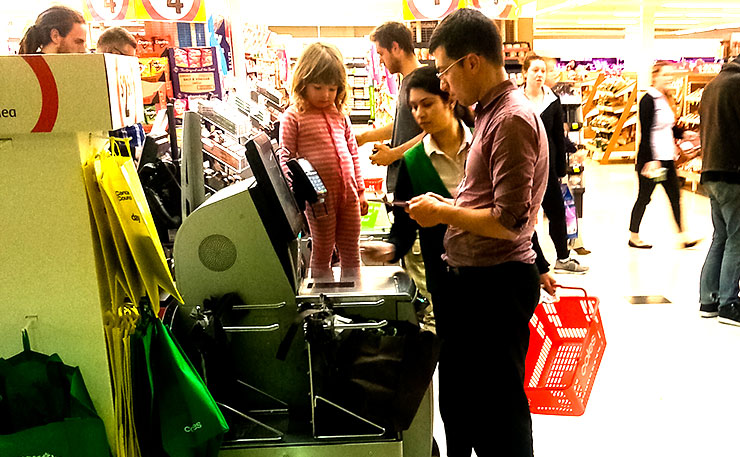Automation and the ‘disruptive’ economy are neoliberalism on steroids. If we don’t figure out an inclusive solution soon, Donald Trump will be a lukewarm version of the chaos to come, writes Barry Dunning.
“How did this happen? How could the white working class be so stupid to vote for that boorish, racist sexist pig? Do they not know what this will mean for minorities and women? I’ll get an Uber over to your house and we can discuss it over a Deliveroo from that $30 artisan pastrami place around the corner, ok?”
Almost a month later, the world is still consumed by the seismic electoral victory of Donald Trump and its ongoing fallout. Progressives remain aghast about why the white working class supported him despite his clear flaws. Take your pick from the menu – was it racism, sexism, class, anti-elitism, islamophobia, the decline of unions, cronyism, the terrible Clinton campaign, or even perhaps the number of improbable sporting victories in 2016? No matter what your personal explanation, two things are clear: come Jan 20th Donald Trump will have possession of the nuclear football and a lot of pissed off people put him there.
Where’s the sharing?
It’s easy to talk about the Facebook bubble and the dozens of fake news sites operated out Macedonia (enterprising global capitalism at its best), which spewed out total nonsense that was accepted as fact. But the reality is that many progressives live in just as great a bubble – and not just via their social media. Outside of our cities’ core, many people are doing it tough – here in Australia and across the developed world. Full time jobs are becoming scarcer than ever, replaced by automation, part-time work or the gig economy.
This is not a new phenomenon. For many the suffering began with the election of Margaret Thatcher, Ronald Reagan and the ascension of neoliberal free market economics. The 1980s saw Thatcher and Reagan smash blue collar union towns across England, Wales and the U.S. Rust Belt.

Thirty years later, many of these towns have still not recovered and in 2016 they swung decisively behind Brexit and Trump. The Great Financial Crisis of 2008, when dodgy politicians, banks and property speculators led the global economy off the cliff was another hammer blow. People lost their jobs, homes and dignity, while bankers received bailouts and bonuses.
But if it’s bad already, it’s going to get a hell of a lot worse. Recent estimates are that 44 per cent of Australian jobs are at risk of computerisation and automation within two decades. In the US it’s 47 per cent.
Rise of the machines
For the knowledge/creative classes clustered in the inner cities, automation and globalism seems to have brought only benefits. Checkouts where you don’t have to speak to anyone. Migrant cleaners for your house or to walk your dogs. Uber drivers so desperate to keep their star rating up that they treat you like a celebrity.
“Sure there may be some disruption from the new economy,” the knowledge classes say, “but people will just get new jobs – that’s how it’s always worked”. This ignores the reality that we are at a fundamental tipping point.
Amazon Prime drivers in the UK are already under so much pressure that they are literally defecating in their vans to keep up. Soon the hundreds of thousands of transport workers in Australia may not even have work. Drones are already delivering packages for Aussie Post and the Flying Doctors. Last month Uber-backed startup OTTO pulled off a milestone/PR stunt when a fully automated truck drove 50,000 Budweiser cans 120 miles across Colorado. Uber is piloting driverless taxis.
It’s not any better for the 1.2 million Australians employed in retail, especially in the big shops like Coles and Woolies, as self-checkouts, online shopping and automated warehouses look set to take the majority of these jobs. With automated burger flippers capable of making 400 burgers an hour it’s not looking too great for fast food workers either. You can say the same about many other jobs – from construction to farming, nursing to accounting, even judges and doctors are at risk of automation.
What will happen to all of these people when their job no longer exists should be keeping us up late at night. The idea that everyone will magically find new jobs in industries that don’t yet exist, or that we will all start our own businesses, is nonsense. There’s not enough work making apricot preserves or knitting dog sweaters to go around. Automated intelligence will be able to do those jobs better than us soon enough.

What’s more likely to happen is the creation of an ever-expanding group of people for whom there are simply no jobs available. Israeli Historian Yuval Noah Harari has even coined the phrase to describe them; the “useless class”. The existing marginalised – created by Thatcher, Reagan, Clinton and Blair – powered Trump and Brexit to victory. They look set to grow exponentially over the coming decades, as automated intelligence makes more and more of us economically superfluous, part of this useless class.
This should be very worrying to anyone who values tolerance, acceptance and equality. Unless you watched Terminator 2 (like this author) at a very formative time in your childhood, it’s too hard to blame automation for taking your job. It’s much easier to blame the other, those who stick out with a different colour skin, religion or who live widely divergent lives in the inner cities. As employment opportunities recede, right wing parties stand to make major gains. Post Trump, Pauline for PM suddenly doesn’t sound so far-fetched.
Hold back the river?
So what is to be done? Many point out that you can’t hold back the tide of automation. This is probably true. But progressives looking to take real action need to realise that the disruptive economy doesn’t benefit everyone and it’s not all going to magically sort itself out. If people lose their jobs and sense of self-worth they become disillusioned with a society that doesn’t value them any longer. They are easy prey for demagogues and fascists with simple solutions and easy targets.
We need time to figure out what we want our future society to look like, how we can ensure that the robots are owned by many not the few, how we can ensure health, education and housing are provided to all citizens, how we can successfully implement potential solutions like a Universal Basic Income, and how we can do all of this without destroying the planet.
These are the big conversations we need to be having instead of getting swept up in pointless arguments with racist cartoonists or flat earthers like Malcolm Roberts.
People should be demanding real action from Government and big business on climate change, corporate taxation and protecting the social safety net. They should be joining their relevant union.
But as well as thinking big, people can also think think small. Support work done by people earning decent wages, instead of validating the gig economy or the headless rush towards automation: stand in the queue at Coles, avoid Uber, or buy a book from a real shop.
And if Amazon Prime ever starts delivering in Australia give it a wide berth. No only do they treat their employees like crap, but some of them may have been forced to crap in the van.
Donate To New Matilda
New Matilda is a small, independent media outlet. We survive through reader contributions, and never losing a lawsuit. If you got something from this article, giving something back helps us to continue speaking truth to power. Every little bit counts.






